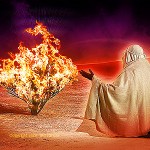 did his abilities. He began to wield magic, physical strength, and mental acuity beyond normality. Jesus said to his disciples, “I tell you the truth, anyone who has faith in me will do what I have been doing. He will do even greater things than these…” (John 14:12). When the believer, through constant conversation and discipline, truly comes to know God, God will begin to manifest great and mighty miracles through him, by the power of His presence within him. A number of believers, from Peter and Paul to Mother Teresa and Oral Roberts, are amongst those whose lives are a testament to the superhuman nature manifested in the lives of those willing to strive to remain constantly in the presence of God.
did his abilities. He began to wield magic, physical strength, and mental acuity beyond normality. Jesus said to his disciples, “I tell you the truth, anyone who has faith in me will do what I have been doing. He will do even greater things than these…” (John 14:12). When the believer, through constant conversation and discipline, truly comes to know God, God will begin to manifest great and mighty miracles through him, by the power of His presence within him. A number of believers, from Peter and Paul to Mother Teresa and Oral Roberts, are amongst those whose lives are a testament to the superhuman nature manifested in the lives of those willing to strive to remain constantly in the presence of God.
A tidal wave of ensuing power rises at my feet as I seek to fully submit my life to the will of God. It is only by this willingness to allow who I am to die that the process is initiated. Tozer further hones the point stating, “The Cross is rough and it is deadly, but it is effective. It does not keep its victim hanging there forever. There comes a moment when its work is finished and the suffering victim dies. After that is resurrection glory and power, and the pain is forgotten for joy that the veil is taken away and we have entered in actual spiritual experience the presence of the living God.” As with Eragon, my contact with God must increase from hours a day to a communication that never ceases. Only then will I be free of myself and equipped to enter an adventure of unfathomable proportions, guided by God. Only then will I soar into the uncharted and electrifying territory, which God has in store for those who love Him (1 Cor. 2:9).
A word of caution: It is not my intent to carry the relationship between the believer and Eragon too far. It is less allegory and more typology in fact. This difference can be illustrated thus: Abraham’s sacrifice of his only son was a type of God’s sacrifice of Christ. In this sense, Abraham is a type of God but this does not require that Abraham be God in any other sense. Likewise, Eragon relationship with Saphira can be seen as a type of the Christian’s relationship with God. Of course, God is most definitely not a dragon or anything like a dragon (nor is Brom, Eragon’s teacher anything close to the person of Christ, if the analogy where to be extended). Eragon is by no means a Christian book, containing the traditional characteristic of it setting, including the pagan practice of divination, amongst other things, which are against God’s Word (Deut. 18:9-12). Eragon and Saphira are on a journey towards a great destiny just as the believer is, but the boy and his dragon are at first bent on revenge and destruction, unlike the believer who by the power and strength of God sets out to bring healing and guidance towards reconciliation. The plethora of differences must be kept in mind at all times when plodding through the dangerous swamps of metaphor in search of pictures of the Christian’s relationship with God.



